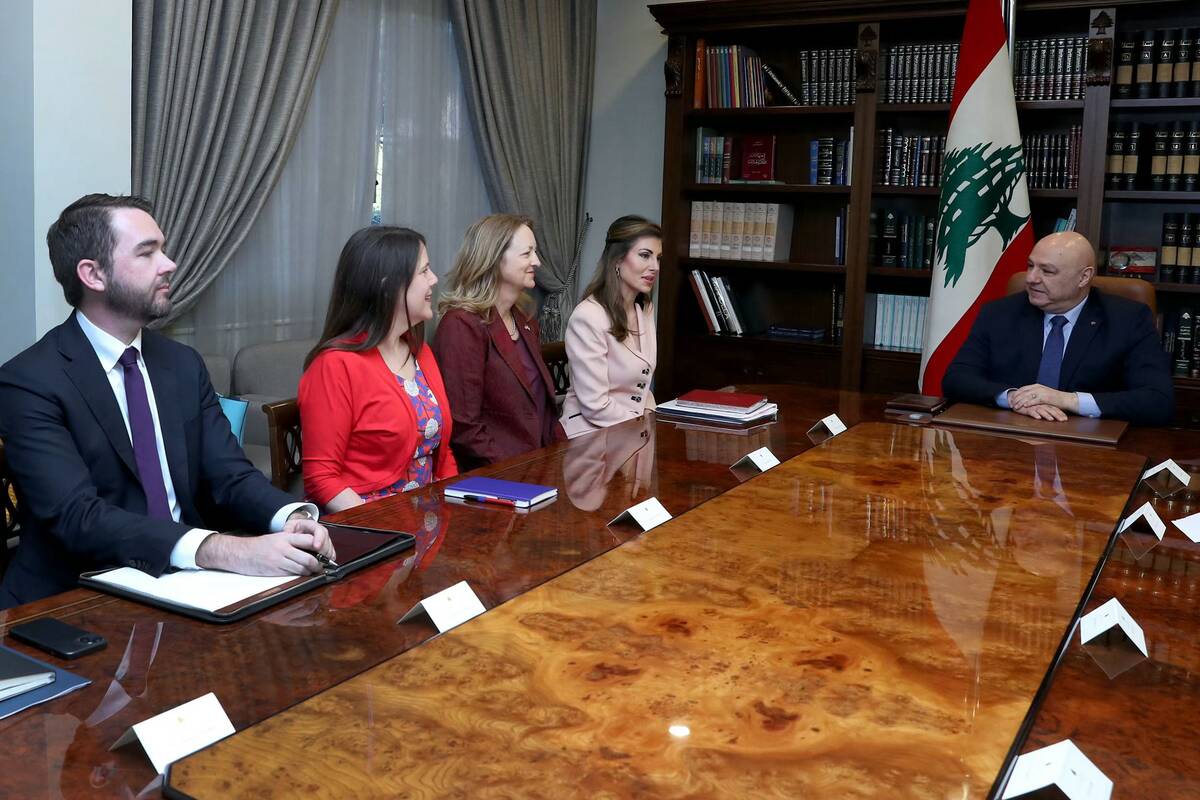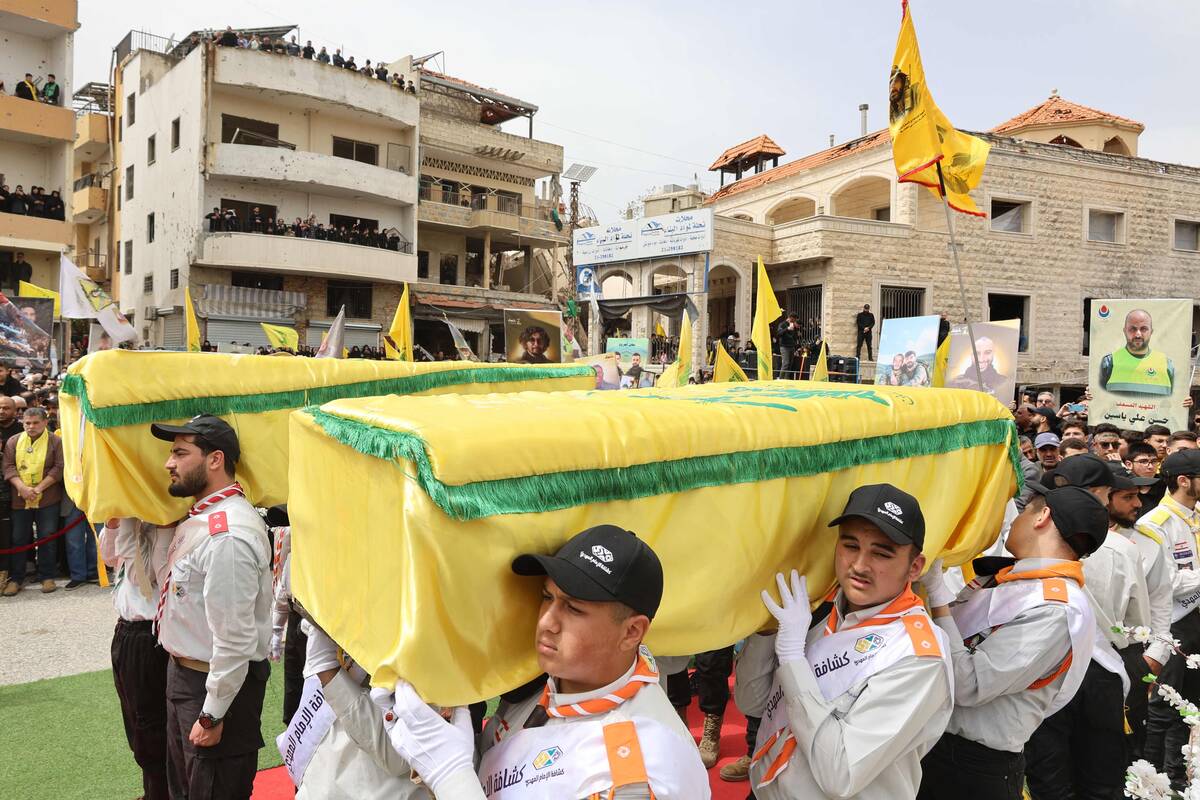LONDON: In just a week, an intensifying Israeli air and ground offensive in Lebanon has forced more than 100,000 people to flee across the border into Syria, resulting in a stark reversal of fortunes for the two beleaguered neighbors.
Where once Syrian refugees were spilling over the border, escaping violence and hardship for the relative safety of Lebanon, it is now Syria’s turn to play host to a desperate population fleeing war and economic collapse.
Both the Syrian government and civil society have been leading relief efforts. But, after 13 years of civil war, Syria is poorly equipped to adequately support the thousands displaced from Lebanon.
While Syria was an ally of Hezbollah during its 2006 war with Israel, taking in some 250,000 refugees, according to UN figures, more than a decade of fighting and economic calamity has left the country deeply impoverished.

Lebanese customs officers help a woman walk 31 July 2006 at the Masnaa border crossing between Lebanon and Syria. (AFP/File)
Authorities in Syria estimate that since Sept. 23, more than 200,000 people have arrived at border crossings in Homs, the Damascus countryside, and the coastal governorate Tartous.
The UN refugee agency, UNHCR, reports that around 60 percent of those crossing the border are actually Syrians — among the approximately 1.5 million who had fled to Lebanon after the Syrian civil war began in 2011.
Gonzalo Vargas Llosa, UNHCR’s representative in Syria, said those arriving — half of them minors — are “exhausted, scared and in need, arriving in a country that has been suffering from its own crisis and violence for more than 13 years, as well as from economic collapse.”
Speaking at a press briefing in Geneva on Sept. 27, Llosa related the story of one woman who had arrived at the border with the bodies of her two children so she could bury them in their Syrian homeland. She told aid officials that both had been killed in an Israeli airstrike.
Fearful they may face arrest, conscription, or fall victim to the ongoing violence if they returned to their home country, many Syrians had long preferred to remain in Lebanon despite the country’s economic problems and mounting hostility against their community.

A woman holds her cat in front of a destroyed building at the site of an Israeli airstrike in Dahiyeh, Beirut. (AP)
However, for those now crossing the border, the rapid escalation between Israel and Hezbollah appears to have eclipsed even these fears.
While communities in Syria welcomed their Lebanese neighbors with open arms back in 2006, treating them as guests rather than as refugees, the picture is very different today. With some 90 percent of the population barely making ends meet, few Syrians have anything to spare.
In 2018, the World Bank reclassified Syria as a low-income country. Its gross domestic product contracted by more than 50 percent between 2010 and 2020 owing to the destruction of infrastructure, the loss of workers and professionals, and the collapse of economic networks.
Nezar Mihoub, head of the Syrian Public Relations Association, said that during the 2006 war, his Damascus-based organization alone “received some 15,000 displaced people from Lebanon.”
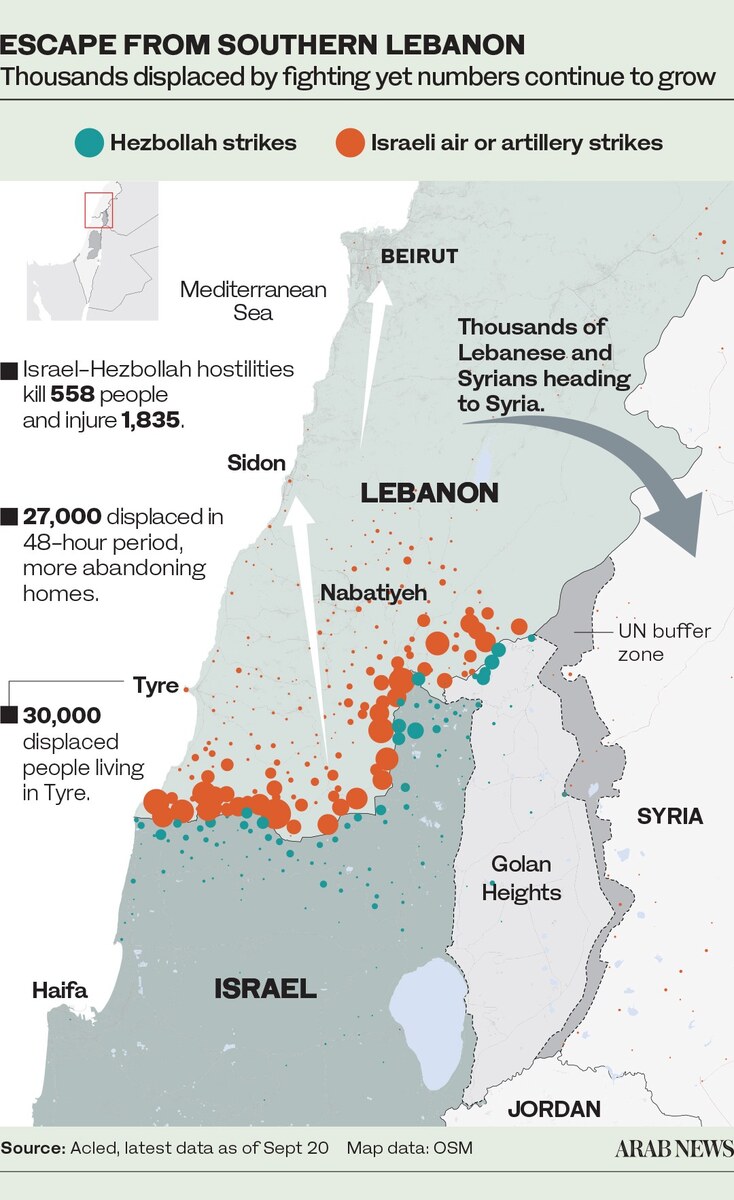
He told Arab News: “We had around 50 volunteers who would travel to the Syrian-Lebanese border to receive and transport Lebanese families from the border to the association’s headquarters.
“During that time, thousands of Syrian families from all sects and backgrounds generously opened their homes to Lebanese people and donated goods in abundance. At one point, Syrians even provided free dental and medical care.”
In one instance, a couple who were about to get married and who had a newly furnished home even postponed their wedding to accommodate a displaced Lebanese family, said Mihoub.
“Emotions ran high in 2006, and Syrians genuinely committed to their humanitarian efforts. But today, they are weary from war and the harsh living conditions.
INNUMBERS
• 1,000 People killed in Lebanon in Israeli strikes over the past two weeks.
• 1m+ People uprooted in Lebanon by ongoing Hezbollah-Israel conflict.
“Today, after more than a decade of war, both the Syrian people and government are depleted. The current economic situation makes it impossible for Syrian families to house and feed displaced Lebanese families as they did in 2006.”
He added: “With over 90 percent of the population living below the poverty line and many families relying on remittances from relatives abroad. The country lacks the resources and financial capacity it had in 2006.”
Support from UNHCR is expected to help ease the burden on the Syrian government and civil society groups, who are determined to stand in solidarity with those who have lost their homes in Lebanon.

A protester holds a sign during a demonstration in support of Lebanese people as intense Israeli attacks across Lebanon. (AFP)
Amal, a former Syria-based humanitarian worker whose name has been changed to protect her identity, told Arab News that “with adequate funding for humanitarian organizations and the government, Syria has the capacity to support those displaced from Lebanon.”
Filippo Grandi, the UN high commissioner for refugees, posted on X that the UN is appealing for $83 million to “urgently meet the needs” of Lebanon’s displaced people, “including those who have crossed the Syrian border.”
By taking in Lebanese refugees and Syrian returnees, Amal believes Syria itself can benefit from the additional humanitarian relief.
“When the Syrian government assists Lebanon’s displaced people, humanitarian funding will be redirected to support relief efforts in Syria,” she said.
“The situation in the region is undoubtedly tragic, but the scale of the crisis will prompt donors to redirect the flow of funds into Syria, as this is an urgent response. And since funding must correspond to the number of people in need, it should increase accordingly as more individuals enter Syria.”
Local authorities, the Syrian Arab Red Crescent, UNHCR, and civil society groups are present at four official border crossings on the Syrian side of the border, including Masnaa in Jdeidat Yabous, west of Damascus, and Arida in Tartous.
Services offered to new arrivals include medical aid, food, water, and blankets, transport to shelter and accommodation, legal advice, and psychological support.
“For the time being, these needs are largely being addressed thanks to relief supplies that we and other partners had in stock, but these will need to be replenished soon,” said UNHCR’s Llosa.

Israeli soldiers fire a tank round from a military position in Kibbutz Snir, along the border between Israel and Syria. (AFP/File)
From Sept. 24 to 29, the Syrian Arab Red Crescent said its mobile clinics provided medical services to 5,074 people who were sick or injured. However, its staff say they have been overwhelmed by the scale of demand.
Local initiatives, such as the Damascus-based charity Mart Group, have stepped in to support relief efforts by distributing bottled water, snacks, and blankets. It has also been giving children wristbands with space to write their parents’ phone numbers in case they get lost.
Marwan Alrez, Mart’s general manager, whose team is stationed at the Masnaa crossing, described chaotic scenes at the border.
“When my team first arrived at the Masnaa border crossing, the first things we noticed were overcrowding, chaos and poor organization, which signaled the gravity of the situation in Lebanon,” he told Arab News.
“All of a sudden, the crossing, which previously handled around 300 travelers per day, is now receiving about 2,000 daily.”
Fortunately, most of the new arrivals have “connections or interests in Syria,” said Alrez. Indeed, while the majority are Syrian returnees, “many of the Lebanese families from South Lebanon have relatives and friends in Syria” with whom they can stay.

Fearful they may face arrest, conscription, or fall victim to the ongoing violence if they returned to their home country, many Syrians had long preferred to remain in Lebanon. (AP)
There have, however, been claims of store holders and border officials ramping up prices and demanding fees in order to profit from the flow of refugees and returnees arriving in Syria from Lebanon.
According to some reports, Syrian returnees had until the end of September been required to pay $100 at the border, while Lebanese arrivals were not asked to present any funds.
“The Syrian refugee who sought shelter in Lebanon only to face further instability now has to pay a fee for the ‘privilege’ of returning to a country that offers no home — only the high probability of arrest and torture,” Syrian activist Douna Haj Ahmad told Arab News.
“The very Syrians who have endured years of war, bombings, and oppression are cast aside, their suffering compounded by this bitter betrayal, while others are welcomed with open arms.”
Karam Shaar, a senior fellow at the Newlines Institute for Strategy and Policy, clarified that the Syrian regime was not taking $100 from Syrians upon arrival but was in fact exchanging it for the local currency, “giving the equivalent in Syrian pounds.”
However, he told Arab News the $100 paid by Syrians at the border was “exchanged at a rate that is currently lower than the black-market rate, which is considered the fair exchange rate as it’s determined by the powers of supply and demand.”
Whatever the nature of this exchange of funds, Zaher Sahloul, president of the US-based nongovernmental organization MedGlobal, said many Syrian refugees had been left “trapped at the border, unable to pay the $100 exchange fee required to enter Syria.”
In a statement on Sept. 30, he called for “immediate action” to “lift these barriers,” adding that “there are also widespread reports of Syrian refugees in Lebanon being denied access to shelter centers, with many now sleeping on roadsides, exposed to the elements.”
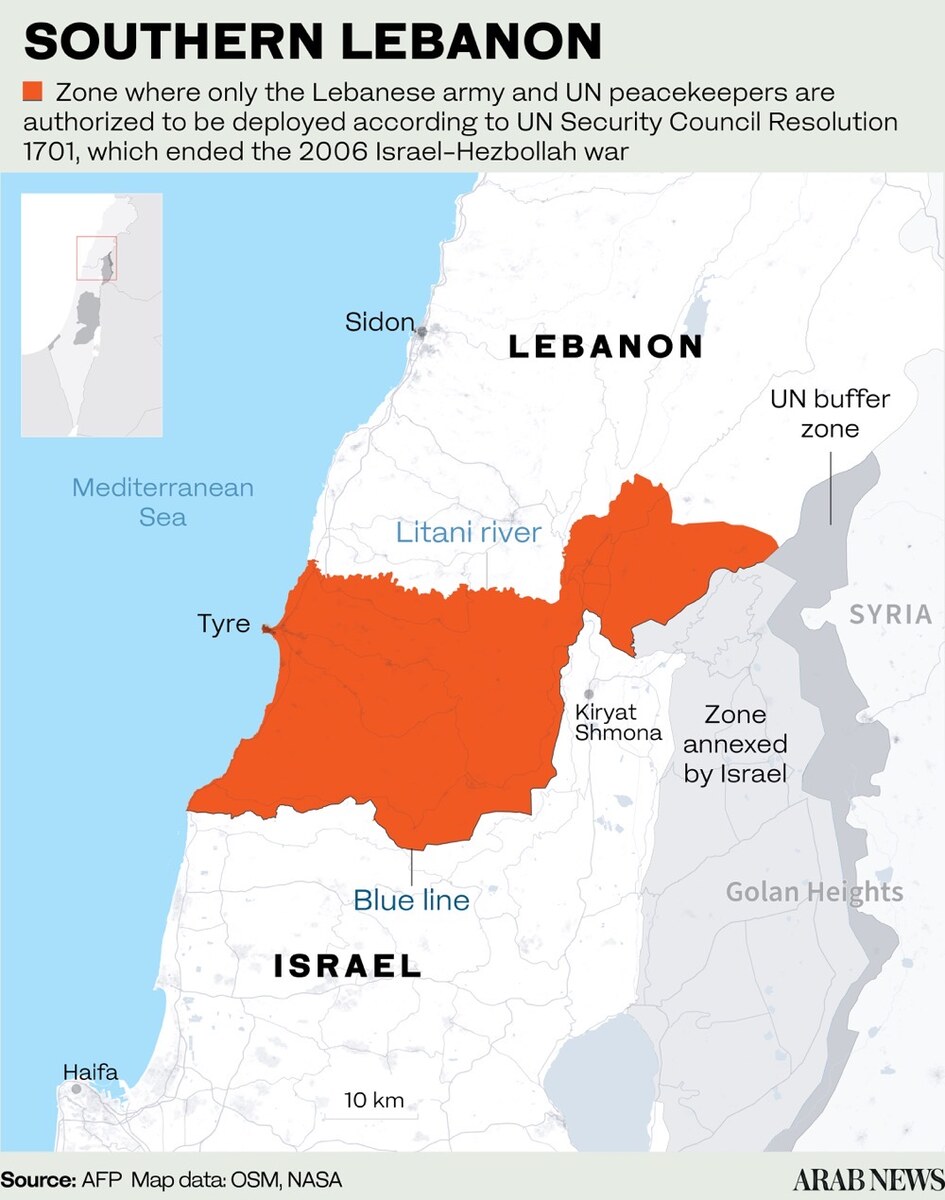
On Sep. 29, the Syrian government announced a one-week suspension of the requirement for Syrian citizens to exchange $100 at border crossings when entering the country.
Officials said the suspension came “in response to the emergency circumstances resulting from the Israeli aggression on Lebanese territories and the subsequent influx of arrivals at the border crossings.”
Shaar of the Newlines Institute believes the alleged preferential treatment of Lebanese arrivals compared to Syrian citizens is partly caused by feelings of “guilt,” saying: “The Syrian regime knows that it should have done much more at least to be aligned with its own rhetoric as part of the ‘Axis of Resistance’ to support ‘Palestinian and Lebanese resistance.’”
The Axis of Resistance is a loose network of Iranian allies and proxies throughout the region opposed to Israel and its Western backers. Although Syria’s Bashar Assad regime is allied with the axis, it has been reluctant to provide material support to Hezbollah or Hamas.
“The Syrian regime is trying to distance itself as much as possible,” said Shaar. “It doesn’t want any military confrontation with Israel, and this has been the case for nearly a year now following the Oct. 7 (Hamas) attacks.”
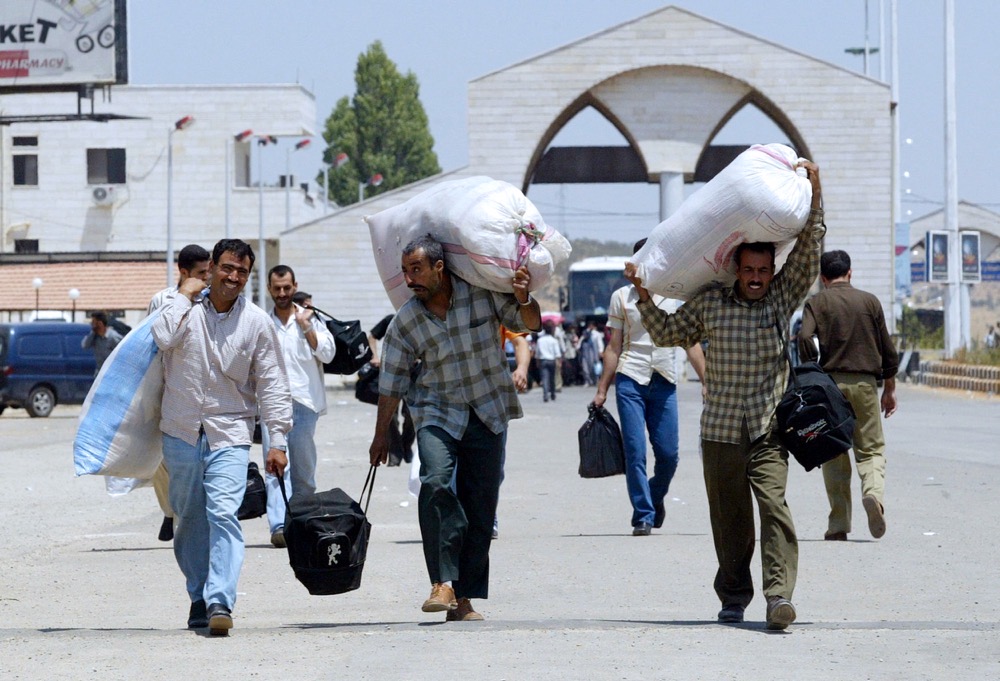
A group of Syrian workers laugh as they head to the immigration office to flee Lebanon and cross to Syria at Jedeidet Yabus. (AFP/File)
Indeed, with armed opposition groups in control of Syria’s northwest, a Kurdish-led administration backed by 900 US troops in control of the northeast, and an ongoing Daesh insurgency in its eastern and central regions, the Assad regime has barely survived its grinding civil war, owing its success to its now preoccupied Russian, Iranian, and Hezbollah allies.
Although regime-held areas have come under repeated Israeli fire in recent years, most notably the April 1 attack on the Iranian Embassy in Damascus, these strikes have tended to be aimed at Iran’s Islamic Revolutionary Guard Corps, which uses Syria as a land corridor to deliver weapons to Hezbollah in Lebanon.
It seems likely the Syrian regime will continue to actively avoid direct involvement in the present conflict. But if events escalate any further, engulfing the wider region, it may have little choice in the matter.















